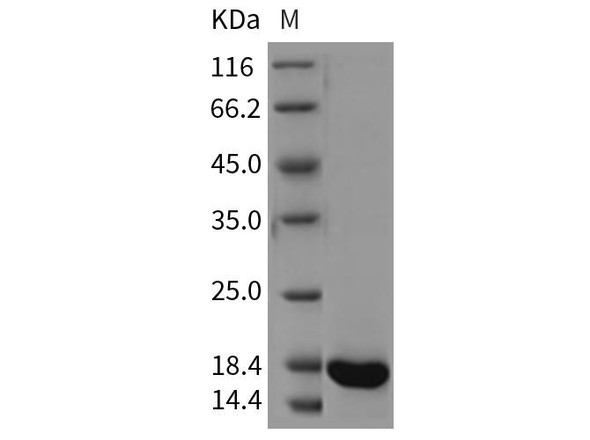Description
| Product Name: | Human REG3A Recombinant Protein |
| Product Code: | RPPB4437 |
| Size: | 10µg |
| Species: | Human |
| Target: | REG3A |
| Synonyms: | Regenerating islet-derived protein 3 alpha, Reg III-alpha, Pancreatitis-associated protein 1, REG3A, HIP, PAP, PAP1, REG3, INGAP, PAP-H, PBCGF, REG-III. |
| Source: | Escherichia Coli |
| Physical Appearance: | Filtered White lyophilized (freeze-dried) powder. |
| Formulation: | Filtered (0.4�m) and lyophilized from 0.5 mg/ml in 0.05M Acetate buffer pH-4. |
| Solubility: | It is recommended to add 0.1M Acetate buffer pH-4 to prepare a working stock solution of approximately 0.5mg/ml and let the lyophilized pellet dissolve completely. For conversion into higher pH value, we recommend intensive dilution by relevant buffer to a concentration of 10?g/ml. In higher concentrations the solubility of this antigen is limited. Product is not sterile! Please filter the product by an appropriate sterile filter before using it in the cell culture. |
| Stability: | Store lyophilized protein at -20°C. Aliquot the product after reconstitution to avoid repeated freezing/thawing cycles. Reconstituted protein can be stored at 4°C for a limited period of time; it does not show any change after two weeks at 4°C. |
| Purity: | Greater than 95.0% as determined by SDS-PAGE. |
| Amino Acid Sequence: | MRGSHHHHHH GMASHMEEPQ RELPSARIRC PKGSKAYGSH CYALFLSPKS WTDADLACQK RPSGNLVSVL SGAEGSFVSS LVKSIGNSYS YVWIGLHDPT QGTEPNGEGW EWSSSDVMNY FAWERNPSTI SSPGHCASLS RSTAFLRWKD YNCNVRLPYV CKFTD |
Pancreatitis-associated protein (PAP) is a secretory protein not normally expressed in healthy pancreas but highly induced during acute pancreatitis. While PAP has been shown to be anti-bacterial and antiapoptotic in vitro, its definitive biological function in vivo is not clear. Using antisepse oligonucleotides, inhibition of PAP expression significantly worsened pancreatitis in a rat model. During pancreatitis, PAP released by the pancreas could mediate lung inflammation through induction of hepatic TNF- alpha expression and subsequent increase in circulating TNF-alpha.PAP is activated in primary liver cancers. In normal liver, the protein is undetectable in normal mature hepatocytes and found only in some ductular cells, representing potential hepatic progenitor cells. PAP can be considered hepatic cytokine that combines mitogenic and anti-apoptotic functions regarding hepatocytes, and consequently acts as a growth factor in vivo to enhance liver regeneration. In pancreatic cancor, PAP was overexpressed in 79% (30 of 38) of pancreatic ductal adenocarcinoma, 19% (7 of 36) of chronic pancreatitis, and 29% (2 of 7) of mucinous cystadenoma. PAP was found in malignant ductular structures in pancreatic carcinomas as well as in benign proliferating ductules and acinar cells in chronic pancreatitis. Elevation of PAP in patients with pancreatic cancer is not merely explainable by concomitant pancreatitis, but seems to be due to increased PAP production by the cancer cells and is also correlated to tumour load as expressed by the UICC stages.Epithelial expression of PAP was induced under intestinal mucosal inflammation initiated by exposure to commensal bacteria or DSS as well as inflamed IBD colon. Increased serum level of PAP diagnosed ileal location in active Crohn disease with a sensitivity of 60%, a specificity of 94%, a positive predictive value of 84% and a negative predictive value of 81%. Elevated serum PAP (> 50 ng/mL) is significantly associated with disease activity and ileal location of Crohn disease.
The Recombinant Human REG3A protein is produced with N-terminal fusion of His Tag. The REG3A His -Tagged Fusion Protein is an 18.4 kDa protein containing 149 amino acid residues of the Human REG3A and 16 additional amino acid residues- His Tag (underlined).
| UniProt Protein Function: | REG3A: Might be a stress protein involved in the control of bacterial proliferation. |
| UniProt Protein Details: | Protein type:Secreted; Secreted, signal peptide Chromosomal Location of Human Ortholog: 2p12 Cellular Component: extracellular space; cytoplasm Molecular Function:carbohydrate binding Biological Process: heterophilic cell adhesion; cell proliferation; multicellular organismal development; negative regulation of keratinocyte differentiation; acute-phase response |
| NCBI Summary: | This gene encodes a pancreatic secretory protein that may be involved in cell proliferation or differentiation. It has similarity to the C-type lectin superfamily. The enhanced expression of this gene is observed during pancreatic inflammation and liver carcinogenesis. The mature protein also functions as an antimicrobial protein with antibacterial activity. Alternate splicing results in multiple transcript variants that encode the same protein.[provided by RefSeq, Nov 2014] |
| UniProt Code: | Q06141 |
| NCBI GenInfo Identifier: | 464341 |
| NCBI Gene ID: | 5068 |
| NCBI Accession: | Q06141.1 |
| UniProt Related Accession: | Q06141 |
| Molecular Weight: | 175 |
| NCBI Full Name: | Regenerating islet-derived protein 3-alpha |
| NCBI Synonym Full Names: | regenerating islet-derived 3 alpha |
| NCBI Official Symbol: | REG3A�� |
| NCBI Official Synonym Symbols: | HIP; PAP; PAP1; REG3; INGAP; PAP-H; PBCGF; HIP/PAP; REG-III�� |
| NCBI Protein Information: | regenerating islet-derived protein 3-alpha; REG-3-alpha; reg III-alpha; PAP homologous protein; human proislet peptide; pancreatitis-associated protein 1; proliferation-inducing protein 34; proliferation-inducing protein 42; hepatocarcinoma-intestine-pancreas; pancreatic beta cell growth factor; hepatointestinal pancreatic protein; regenerating islet-derived protein III-alpha |
| UniProt Protein Name: | Regenerating islet-derived protein 3-alpha |
| UniProt Synonym Protein Names: | Hepatointestinal pancreatic protein; HIP/PAP; Human proislet peptide; Pancreatitis-associated protein 1; Regenerating islet-derived protein III-alpha; Reg III-alpha |
| Protein Family: | Regenerating islet-derived protein |
| UniProt Gene Name: | REG3A�� |
| UniProt Entry Name: | REG3A_HUMAN |










